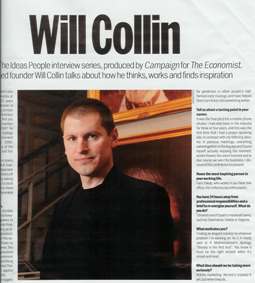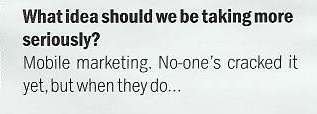mobile advertising quote of the week
 In this week’s Campaign, there is a quote that could not go unreported. As part of the Economist’s advertorial on inspiration, they interviewed Will Collin (left) who is a founding partner of Naked Communications about “inspiration”.
In this week’s Campaign, there is a quote that could not go unreported. As part of the Economist’s advertorial on inspiration, they interviewed Will Collin (left) who is a founding partner of Naked Communications about “inspiration”.
In the Q&A that followed, he was asked “what idea should we be taking more seriously”.
In his response (copied below) he singles out mobile for a mention.

Now obviously, I agree with him! In looking through my RSS feeds over the weekend, I came across a relevant blog post from Scott Seaborn, who is Head of Mobile Technologies for Ogilvy Group.
In Scott’s post – titled “How’s your mobile strategy looking? When mobile kicks off will you be ready?”, he quotes WPP CEO, Sir Martin Sorrell who said recently that mobile is the most overhyped thing that he had ever heard of in the short term but the most under hyped thing that he had ever heard of in the medium term.
Both Will and Sir Martin make excellent points. We hear a lot of hype at the moment about how big mobile will be, etc etc but the medium has not gone mainstream yet. Thankfully industry associations like the Mobile Marketing Association are starting to develop education and awareness programs for this very powerful medium.
One thing that scares many people, is that when as an industry we do get it right, the campaign response metrics and information that we will get from mobile will be very powerful indeed.
In Scott’s post referenced above, he talks about using mobile as a “mini radio station” and broadcasting to your customers. This makes sense, but will have to come after consumers trust this channel, and choose to “tune in” to a particular brand station.
Using this radio analogy, we can see that with permission (opt-in) the user agrees to “tune in” to your station. With preference, the user decides which station they will listen to.
Mobile has a distinct advantage here, especially if the user agrees to provider the advertiser (read broadcaster with the radio theme) with their preferences, and permission to communicate.
The challenge for the mobile advertiser will be to select the right channel with which to engage with them. There are a number of current ways that we try to “broadcast” to our consumers – text messages, banner ads etc, but none of these embrace the real concept of user preference.
Just because I am on a travel website does not automatically mean I want a travel ad – I may be researching the hotel that I am going to be staying at for the next conference that I have already booked.
If I was to tell the advertiser because of my ongoing relationship with them what my preferences are, we would not have to guess – we would know what they are looking for because they have told us.
Another way to look at this is imagine if one of our friends was an advertiser. Because they know us well and we have given them permission to communicate with us – the message they deliver is likely to be spot on.
While we continue to guess a user’s preference, we will continue to get it right only part of the time and with mobile we have the opportunity to provide a very efficient targeting mechanism because of the immensely personal nature of mobile.
The things coming down the pipeline that people like Scott and I are seeing in the mobile advertising space I am confident will provide the level of permission and personalisation that advertisers are seeking. It will just take time to adopt these new technologies and approaches to mobile advertising.
Scott’s 3P’s: Permission, Privacy and Preference will also continue to be key themes around which all successful mobile advertising campaigns will be constructed.
Let’s hope that soon we can go back to Will Collin and tell him that someone has cracked mobile advertising. Then….it will be big.